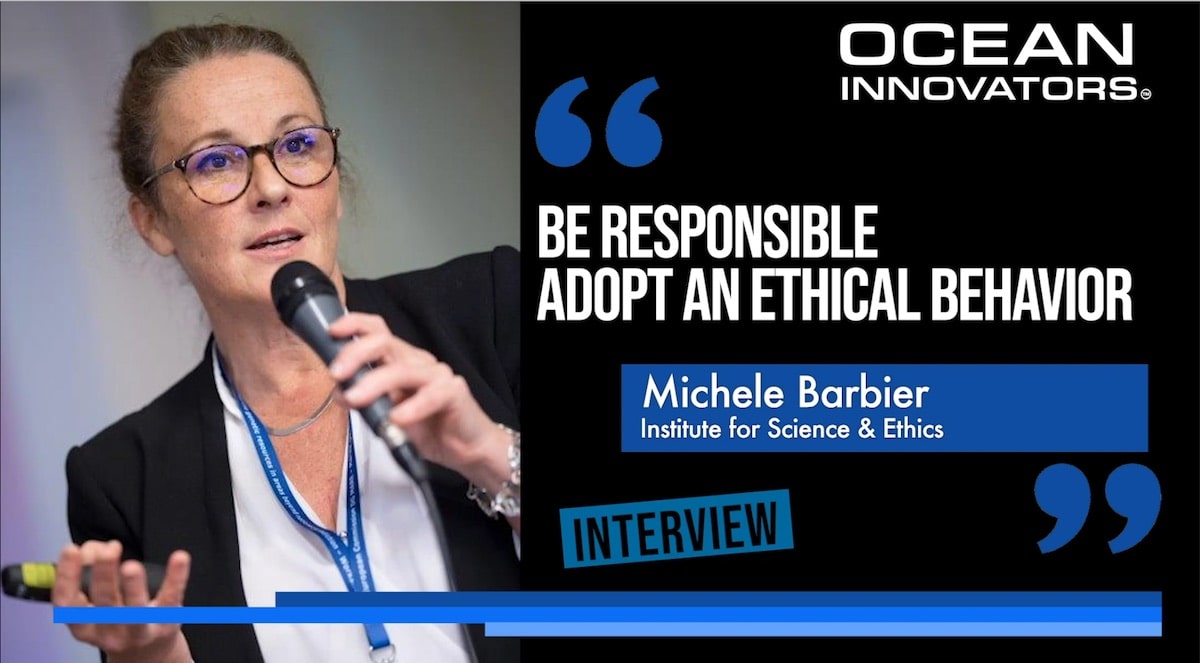There is an urgent need to assess human pressures on the ocean, particularly in vulnerable coastal areas. Investors are increasingly looking towards the ocean for economic opportunities, resulting in a rapidly expanding Ocean Economy. We need to secure this space for future generations. Dr. Michele Barbier has developed the concepts of ocean ethics and the ethics of innovation. Today more than ever we need innovations and solutions that are sustainable. Motivated by the belief it is the responsibility of everyone to find a solution and to take care of the planet, she launched the Institute for Science and Ethics.
Institute for Science and Ethics
The Institute for Science and Ethics was founded in 2017 and is located in Nice, France. The objective of the Institute is to develop the ethics dimension in science and innovation. This, in order to promote the sustainability of the ocean and the preservation of biodiversity. The objective is also to develop a model of governance based on socio-ecological systems. Hence, access to knowledge is accessible to all and it ensures the resilience of the earth system through the involvement of the various stakeholders in their field of activity.
The Institute also develops new concepts about ethics and ocean science and. It has published ethical guidelines for ocean observation. The document called for responsibility the scientific community regrouped in the H2020 AtlantOS project. Among the nine recommendations are “compliance with laws”, emphasising the Nagoya Protocol and the CBD, as well as “respect for cultural differences” and “knowledge transfer”. Michele adds on with her knowledge of oceanography and training in biology. Indeed, it is key in providing advice on monitoring the status and trends of marine and coastal biodiversity.
Ocean Ethics: A new model governance
The Institute for Science and Ethics would like to promote, develop a model of governance that is not pyramidal. Instead, use a centric base on the cooperation with stakeholders and actors around specific projects. It is necessary when you have an innovation where the different parties (politics, decision-makers, society, associations, economic actors) are part of the discussion and reflection. So, all aspects can be considered. We can have a broad understanding and view of the considered innovation and its impacts (positives or negatives).
What are Ocean Ethics and ethics of innovation?
The ethics of ocean sciences is a reasoned reflection and a set of actions based on technological progress. It aims to develop ocean knowledge and innovation. It takes into account external dimensions, which are environmental, societal, legal, political, social, economic, historical, philosophical, and cultural. In Michele’s view, commendable and responsible behaviour is necessary for science and society to support oceans’ sustainability and stability. But also the resilience of the earth system. ‘It is about having a global overview of what we are doing and how we can minimise the negative impact on human well-being, the freedom of humans, and the environment for future generations,’ Michele said.
The ethic of innovation aims to address all the challenges potentially posed by innovation. The goal is to ensure the safety, security, and well-being of our society and environment. Michele sees innovations as necessary for our society and a part of our future. ‘We always need to evolve. We need innovation […]. Right now, we need new solutions that are sustainable,’ Michele said.
Current Projects
The Institute for Science and Ethics current projects are part of different scientific sectors or aspects.
- “Ocean4Biotech” is about marine biotechnology and the exploitation of marine resources. It goes from discovering new molecules or pharmaceutical applications to cosmetics. This aspect is important because we need a new solution for exploitation. Exploration of the potential for the sea without and this without completely destroying the environment. It’s also important because when we have a biodiversity hotspot located in the southern countries, sharing the benefits arising from the use of these resources is key. So, it’s really important to pay attention to these benefits from these countries.
- PEGASUS guidelines: Phycomorph European guidelines project is about sustainable seaweed aquaculture. The objective of these guidelines is to advise the industry and policymakers on environmental measures to be adopted in order to preserve local biodiversity while developing an economy. We need to develop this sector. It will be a big business sector and the United Nation and the European Commission are really interested in it. It’s important to not affect the environment using exotic species or similar nuisance species. So, by developing these new sectors of activities, we need to preserve the environment. But not only, preserving humanity and the integrity of humanity is part of the process.
- H2020 project EuroSea project is aiming at advancing research and innovation towards a user-focused, truly interdisciplinary, and responsive European ocean observing and forecasting system, that delivers the essential information needed for human well-being and safety, sustainable development, and blue economy in a changing world and where the ethics approach and Responsible Research and Innovation concept are developed.
- Other projects are related to the ocean observing system, where you have many instruments in the ocean measuring different parameters. For instance, instruments to measure the weather forecast or signal maritime routes in the ocean. Every time we place an instrument in the ocean, we should take care of the pollution it might engender.
How to help?
Are you an innovator with questions around ethics or struggling with challenges related to external dimensions of your project? Visit the Institute for Science and Ethics and get in contact with Mrs. Barbier. She wants to interact with innovators, working with them to identify their challenges and find solutions together. Ethics help create methodologies that create solutions for our oceans.
Because “industries must ensure that the effects of their actions do not destroy the autonomy, dignity, integrity and vulnerability of future humanity“
Michele Barbier
